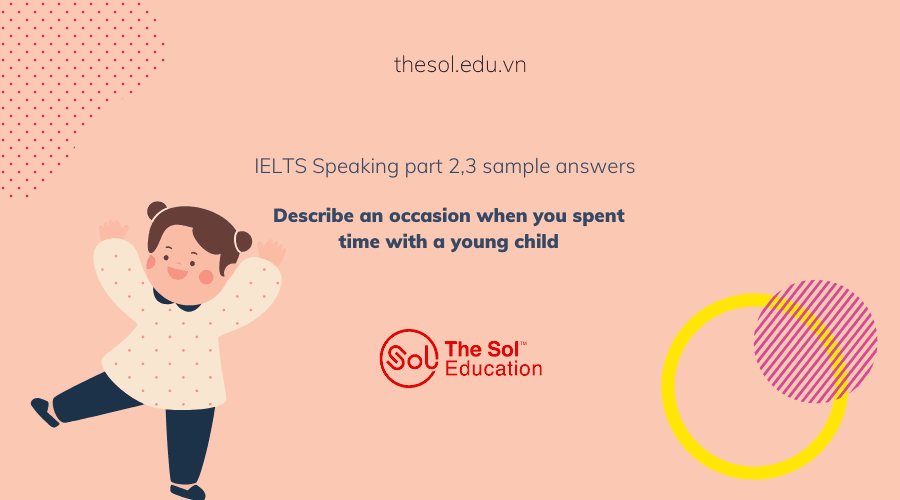Khám phá các câu trả lời mẫu cho đề IELTS Speaking part 2: Describe an occasion when you spent time with a young child và các câu hỏi IELTS Speaking part 3 đi sau đó.

Part 2: Describe an occasion when you spent time with a young child
You should say:
A time when I spent quality time with a young child that left a lasting impression on me was during a summer vacation in my hometown. My cousin had recently welcomed a new addition to their family, and while everyone was busy doting on the newborn, I had the opportunity to spend meaningful moments with their elder daughter, a delightful 3-year-old girl.
Firstly, I must say that witnessing a child at the age of 3 is fascinating, as they are at a crucial stage of their development, expanding their understanding of the world and forming relationships with others. This young girl's curiosity and enthusiasm were infectious, and it made our time together truly enjoyable and memorable.
We engaged in various activities that catered to her age and interests. We played interactive games that stimulated her cognitiveabilities and problem-solving skills. Additionally, we indulged in creative pursuits such as coloring and drawing, which allowed her to express her imagination and artistic flair. These moments were filled with laughter, joy, and a sense of wonder as we explored new ideas and concepts together.
To make our bonding experience even more special, we watched cartoons on her tablet, fostering a shared sense of entertainment and amusement. It was heartwarming to observe her reactions and listen to her interpretations of the stories. Engaging in these simple yet meaningful activities helped us build a strong connection and forge a genuine bond.
Surprisingly, I found myself thoroughly enjoying this time spent with the young child. Prior to this experience, I had assumed that interacting with young children would be exhausting or monotonous. However, I discovered that the pure innocence, genuine curiosity, and unabashed joy exhibited by a young child can be incredibly refreshing and uplifting. In fact, I found her company to be more enjoyable than that of many adults.
In conclusion, the occasion when I spent time with my cousin's 3-year-old daughter stands out as a cherished memory. It opened my eyes to the wonders of spending quality time with young children, allowing me to appreciate their unique perspective on life and their boundless capacity for joy and imagination. This experience reinforced my belief in the transformative power of genuine connections and the beauty of embracing the innocence of childhood.
Dưới đây là một số từ vựng hữu ích được dùng trong bài nói trên:
In my opinion, while it is important for children to have toys to aid their development and entertainment, I believe that the quality of toys is more significant than the quantity. It is crucial for children to have a few educational and interactive toys that encourage creativity, problem-solving, and social interaction. Excessivematerialism can hinder a child's ability to appreciate and value their possessions, therefore it is advisable to strike a balance and prioritize toys that contribute to their holistic growth.
Children typically engage in play activities both indoors and outdoors. Indoors, they often play in their own rooms or designated play areas where they can engage in imaginative play, construct puzzles, or play board games. Outdoors, children enjoy playing in parks, playgrounds, or backyards, where they can engage in physical activities, interact with peers, and explore their natural surroundings. Providing children with diverse play environments fosters their cognitive, physical, and social development.
Rules and guidelines play an essential role in a child's upbringing, providing structure, discipline, and a sense of responsibility. However, an excessive number of rules can stifle a child's autonomy and creativity. It is crucial for parents and educators to strike a balance, ensuring that rules are reasonable, age-appropriate, and consistent. By promoting a supportive environment that encourages open communication and understanding, children can learn to internalize values and make responsible decisions.
While it is important for children to understand and respect rules, it is equally important to teach them critical thinking and encourage them to voice their opinions. Children should be encouraged to ask questions and express their concerns respectfully. This approach nurtures their ability to discern between rules that promote safety, morality, and cooperation from those that may be arbitrary or outdated. Teaching children to evaluate rules based on their underlying principles enables them to develop a sense of autonomy and moral reasoning.
Parents play a vital role in guiding and supporting their children's decision-making process. It is essential for parents to provide guidance, based on their experience and wisdom, particularly when children are young and lack the necessary maturity to make complex decisions. However, as children grow older, it becomes crucial to foster their independence and autonomy by involving them in the decision-making process. Parents should act as facilitators, encouraging their children to weigh options, consider consequences, and develop critical thinking skills to make informed decisions.
Parents can play a constructive role in helping their children choose friends by providing guidance and teaching them about positive social interactions. By discussing the qualities of healthy friendships, parents can help their children develop discernment and make informed choices. However, it is equally important to allow children to explore their own social connections and learn from their experiences. Encouraging open communication and maintaining a supportive environment enables children to develop their social skills and build relationships based on shared values and mutual respect.
Dưới đây là một số từ vựng IELTS hữu ích được sử dụng để trả lời 6 câu hỏi IELTS Speaking part 3 trên:
